Fair Dues?

Author earnings fall while Publishers Association announces record book publishing revenues.
ALCS’s latest survey into writers’ incomes, Authors’ Earnings 2018: A Survey of UK Writers, found that overall the earnings of working writers continue to decline. Shortly afterwards the UK Publishers Association (PA) released its Publishing Yearbook 2017 which records publishers’ invoiced sales.
The Yearbook figures show that British publishing houses broke all previous revenue records in 2017 to see their collective sales of books and journals rise 5% to £5.7 billion. With a few exceptions, all areas of the market performed strongly, with total income from the sales of books alone (both physical and digital) up 4% in 2017 to £3.7 billion.
This rise was mainly driven by a growth in export sales which now account for 60% of publishers’ revenues, a trend which only underlines the importance of the fast-growing creative industries – now valued at £92 billion – to the British economy as a whole.
The Yearbook figures show that British publishing houses broke all previous revenue records in 2017 to see their collective sales of books and journals rise 5% to £5.7 billion.
The latest PA figures stand in sharp contrast with those released by ALCS which show that the median earnings of professional writers – including many book authors have fallen by 42% in real terms since 2005, and by 15% since 2013. Anecdotal evidence – including that from writers Pete May and Anne Rooney in their recent interviews for ALCS News – shows that across the board, book advances and fees have declined in value, and in many cases disappeared altogether. The consequence is that writers are having to work harder for the same level of income, or deal with a fall in income as best they can.
While a healthy publishing industry is clearly vital to the future livelihoods of authors, many prominent writers, including Malorie Blackman and Antony Beevor have long been calling on publishers to pass on a larger share of their profits to authors. Even before the latest ALCS research and PA data were released, Philip Pullman, President of the Society of Authors (SoA) was quoted as saying: “To allow corporate profits to be so high at a time when author earnings are markedly falling is, apart from anything else, shockingly bad husbandry. It’s perfectly possible to make a good profit and pay a fair return to all of those on whose work, after all, everything else depends.”
In an article for The Bookseller in March 2018, SoA chief executive Nicola Solomon wrote: “Publishers, of course, have a duty to make a profit for shareholders. But unless authors receive proper returns, the supply of quality work will inevitably diminish. The decision to become an author often means eschewing the security of a stable job. A 2016 EU study raised concern at the low remuneration and lack of legal safeguards for UK authors. The proposed EU copyright directive includes provisions for bestseller clauses if agreed remuneration is disproportionate to the revenues derived from their works. We ask publishers to adopt these and also revert unexploited rights, improve advances and adopt escalator [royalties].”
Solomon also makes the point that it is publishers’ interests to pay authors a fair share of their profits if they are to encourage new and diverse voices to take their place among the writers of the future, rather than drawing only from the ever rarer minority who can afford to make writing their sole career.
In conclusion, Solomon called on publishers to provide the following:
- Fair terms: ahead of EU legislation, all publishers should sign up to SoA’s CREATOR principles.
- Accounting: transparent and clear accounting to show exactly how much publishers pay authors, illustrators and translators.
- Increased shares: publishers should commit to paying authors a higher proportion of turnover, and increase advances and escalators.
- Redistribution to a wider pool, not just celebrities but to writers from across society, and publish how author share is distributed in accounts.
Owen Atkinson, Chief Executive of ALCS, said:
“The PA’s latest report proves the huge and growing demand for the work of writers. Their statistics point to steady growth and increasing profits in the publishing industry, yet in contrast, our last three authors earnings surveys in little over a decade have shown a steady decline in author income. This clearly shows it is authors who are often cut out of the reward chain to boost profit margins elsewhere, yet it is their work on which the industry relies.
“Nicola Solomon of the Society of Authors, and myself both recently invited Stephen Lottinga of the PA to meet and discuss the findings from the ALCS survey. A first meeting took place on 31 July and we would like this to be the start of a regular dialogue because it’s only by working together that progress can be made. Failure to do so will have a serious impact on the quality of the work being made available to publish in the future, which will of course affect the whole publishing market.”
- Read the more about the PA’s figures from their Publishing Yearbook 2017
- Read the latest ALCS authors’ earnings report in full
Report by Caroline Sanderson, Editor of ALCS News
